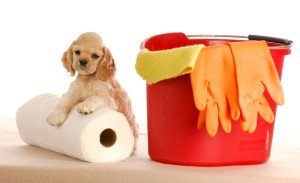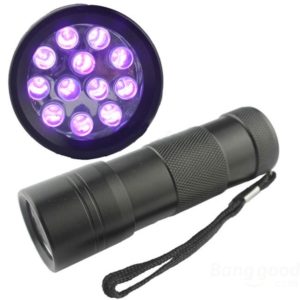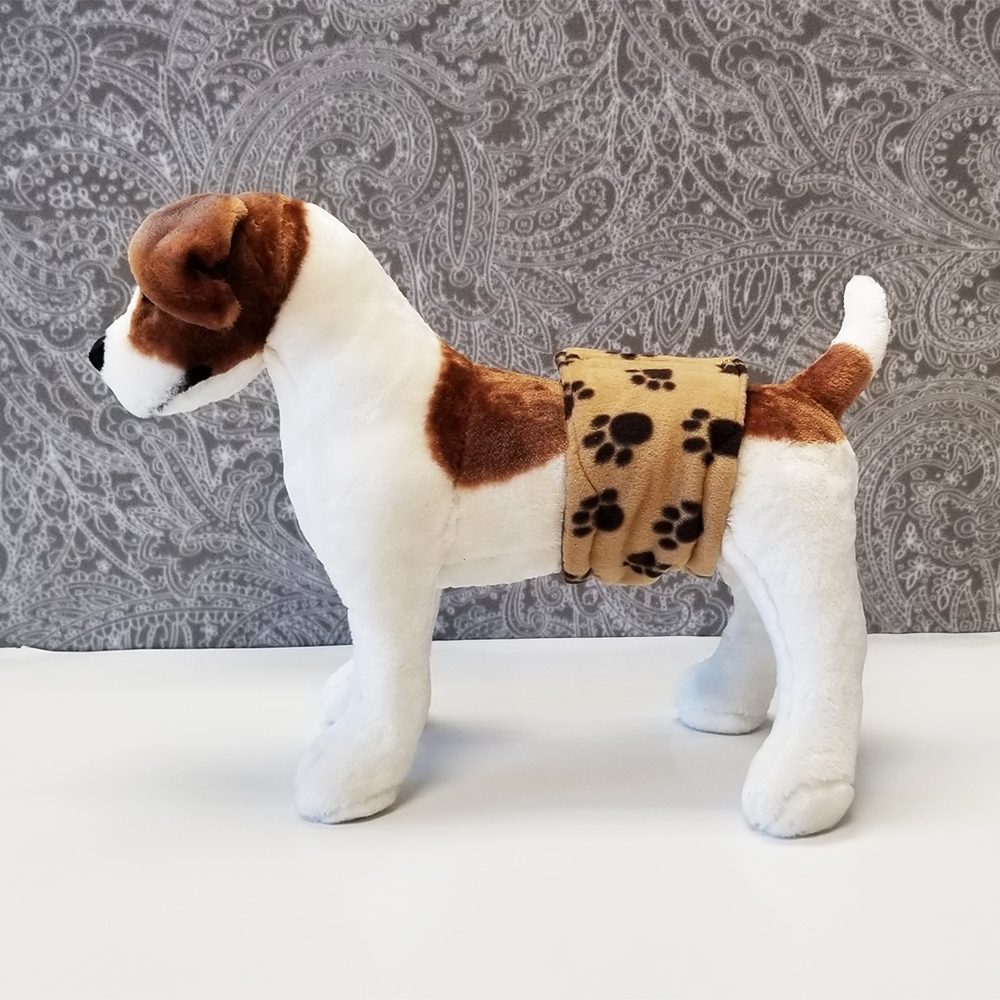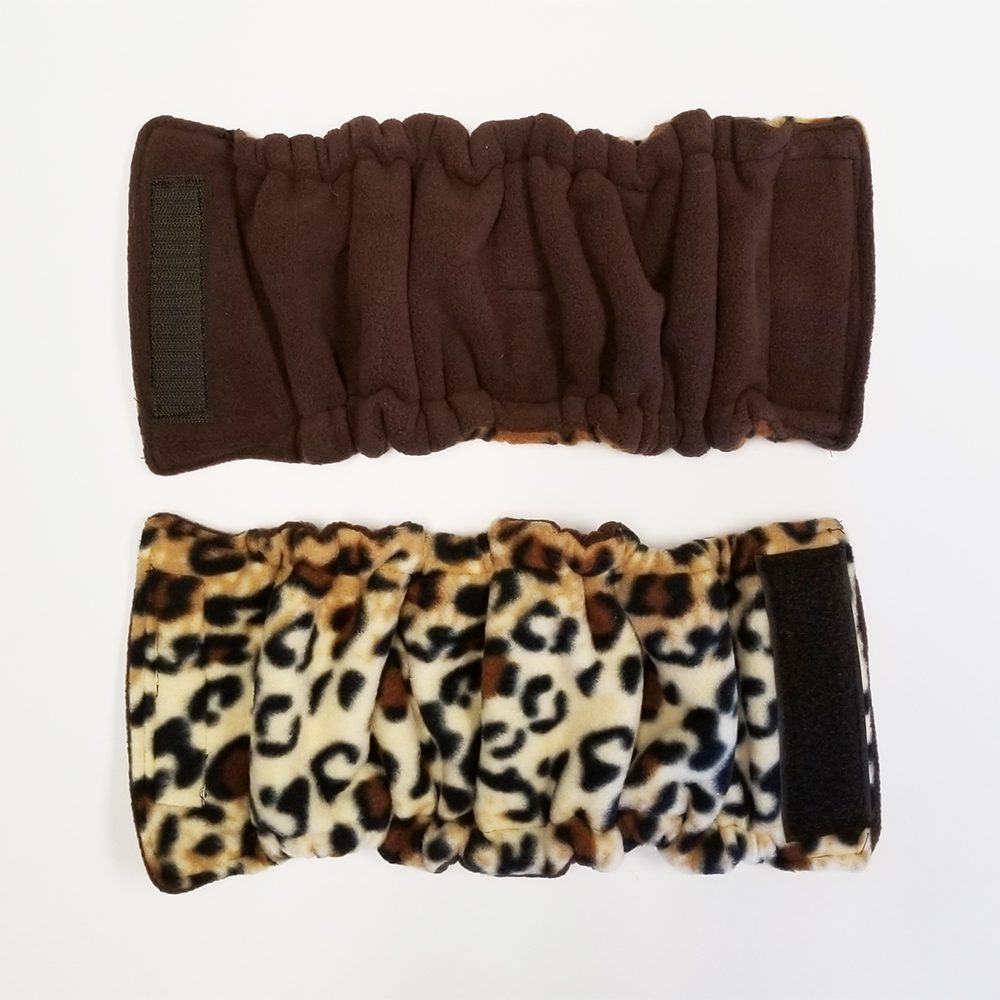Puppy Housebreaking Training Tips and Tricks
Puppy housebreaking takes patience and consistency. Don’t give up! Keep in mind that puppies are unable to completely control their bowels until they are about four to six months old. You will have some success during the early months; however, you should expect accidents. To avoid difficult clean-ups, keep puppies supervised at all times, or on an easy-to-clean surface such as tile when unsupervised, until you are certain that your pup is housebroken. Once you allow your pup to urinate in the house, he is likely to return to the same spot the next time he has to relieve himself.
For Adult Dog Marking click here.
Housebreaking a puppy requires that you let your puppy outside often to potty. We recommend that, at first, you let your pup outside every hour, if possible. Your puppy should always be let outside to potty just before you retire for the night. Likewise, as soon as your pup wakes up in the morning, the first thing he will need to do is relieve himself. You should waste no time in taking him outside as soon as he awakes. When your pup hears you get up in the morning, it will be his signal to wake, so attend to him before going about your morning routine. Some pups may cry that they need to go outside at the first sign of light, and if you want a dry floor, it is usually necessary to immediately respond to their needs.
Your pup will also have to relieve himself shortly after a meal, and will need to urinate more often during the summer when his water intake is higher. As soon as your puppy finishes dinner, place him outside for several minutes until he potties. At other times, you may notice your pup sniffing the floor for a suitable place to relieve himself. He may whimper or start to squat. Scoop him up immediately and place him outside.
As with adult dog marking, the key to puppy housebreaking is to prevent your puppy from leaving urine scent in the house. Dogs, being creatures of habit, are enticed to mark in these same spots by the urine odor.
If your puppy does wet in the house, clean any areas where your dog has urinated with a product made specifically to clean and deodorize dog urine. Products such as baking soda or club soda simply won’t break down the urine and completely remove it from your carpets and furniture. Unless the urine is thoroughly removed, your dog will recognize even the smallest scent that humans can’t notice, and he will be drawn to wet in the same area. Blacklights are often used to find old urine stains, and a product called Odormute will remove all traces of the scent that attracts puppies back to the same stain to re-wet. Both products can be found here.
Another important part of puppy housebreaking is to be proactive and prevent your dog’s opportunities to wet in the house. This will take time, effort, and patience on your part, but it will make the puppy housebreaking process move along much quicker and will pay in the long run.
When housebreaking, the most important thing to remember is that your dog should be loose in the house only when you can watch him at all times. This means that if you are busy cooking, your dog should not be allowed to go into the bedroom or any other room where you cannot watch him carefully, even for a few seconds. Puppies can wet quickly and without notice, and a few unsupervised “seconds” can lead to urine spots that you might not immediately notice. Each time your dog successfully marks in the house, it reinforces this behavior and his desire to do so.
If your puppy does have an accident in the house, scold him only if you catch him in the act. If you scold him even a minute or two after he has made a mess it will confuse him because he will not know why he is being scolded. If, however, you catch him in the act of relieving himself in the house, pick him up and say “No” in a firm voice. Do not yell. Immediately take him to the outside area where you want him to relieve himself. Never rub his nose in the mess or hit him; this will cause him to fear you and will make future obedience training more difficult. Be sure to clean the soiled area with a product intended for housebreaking accidents.
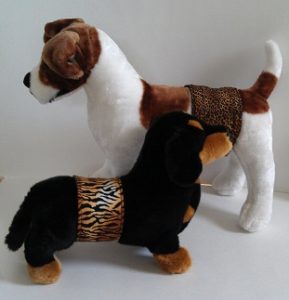 Many puppy owners who can’t watch their dogs every minute use belly bands as a housebreaking aid to help control urine messes and train their dogs not to wet in the house. Belly bands comfortably wrap around your dog’s belly and a sanitary maxi pad is placed in the bottom of the band. When the dog tries to wet in the house, urine is absorbed by the maxi pad and carpet and furniture remain clean. Dogs cannot leave their urine and scent, thus eliminating soiled areas that would attract them to re-wet in the future. The bands also serve as a constant reminder to your dog not to wet in the house. Belly bands do not take the place of normal puppy housebreaking, and should be used with puppies for those times when you are busy and cannot keep a constant eye on your pup. Many dogs are reliably housebroken with the extra help of belly bands , keeping homes fresh and urine-free. Bellybands can be found at bellybands.net.
Many puppy owners who can’t watch their dogs every minute use belly bands as a housebreaking aid to help control urine messes and train their dogs not to wet in the house. Belly bands comfortably wrap around your dog’s belly and a sanitary maxi pad is placed in the bottom of the band. When the dog tries to wet in the house, urine is absorbed by the maxi pad and carpet and furniture remain clean. Dogs cannot leave their urine and scent, thus eliminating soiled areas that would attract them to re-wet in the future. The bands also serve as a constant reminder to your dog not to wet in the house. Belly bands do not take the place of normal puppy housebreaking, and should be used with puppies for those times when you are busy and cannot keep a constant eye on your pup. Many dogs are reliably housebroken with the extra help of belly bands , keeping homes fresh and urine-free. Bellybands can be found at bellybands.net.
If you are away from home during the day, your puppy should not be allowed to have unsupervised run of the house. If your pup is unsupervised and allowed to wet on carpet and furniture while you are away, it will be virtually impossible to reliably housebreak him. Ideally, when you are not home, you should keep your puppy in one room that has an easy-to-clean flooring such as tile. Child gates or puppy gates can be used to block off the entrance to the rest of the house and keep your pup confined to the one room. If you have a doggy door, keep your puppy confined to a small area around the doggy door.
Puppy Housebreaking may be quickened if your pup sleeps in his crate. Dogs dislike sleeping in a soiled area, and your pup will soon learn to wait until you let him out of his crate to do his business. Of course, it may take a few months before your pup is able to hold his bowels all night. As he gets older, he will have fewer and fewer accidents. Expect this, and never scold him for accidentally soiling his area at night.
With your help, effort, patience and consistency, your pup will eventually become housebroken. Once your pup is four to six months old, if he is still having accidents in the house, belly bands can remind him not to wet and prevent him from developing a habit of wetting in the same places.
PUPPY HOUSEBREAKING PROBLEMS…..some common issues, and what to do.
When your pup says, “I am NOT going to go potty now!”
1. Be very patient. Do not let the pup talk you into playing.
2. Try to go to the same area, leave a scent pad for reminder.
3. Be very quiet. DO NOT distract the pup from his purpose.
4. Confine the pup in small area until outside success is achieved.
5. Use another dog to prompt pup. Remember – no playing.
But I want to eat my feces!
1. Brought on by example, influenced by the desire to be clean.
2. Usually occurs when pup has been bored, alone, or confined.
3. Use a product called Forbid.
4. Can be hormonally triggered in females.
Diarrhea causes difficulty in housetraining!
1. Try to be patient as loose bowels create the need to go often.
2. Could be caused by worms (even microscopic) or other parasites you cannot see.
3. If worms or other parasites are present have your veterinarian treat your dog.
4. Could be caused by an allergic or other reaction to the dog food your dog is eating.
5. Could even be caused by the food you eat and share.
6. Ask your vet about dosage before treating with Pepto Bismol, Imodium AD or other binder.
7. Diarrhea can be life-threatening in puppies due to dehydration. Take your pup in to your vet for a checkup to find the cause ASAP, especially if there is blood in the stool.
This information is copyrighted and is the property of the author. You may not use any information from this page; however, you may link to this page.


